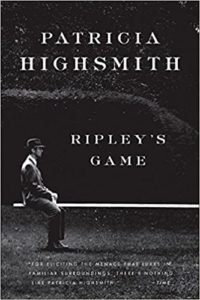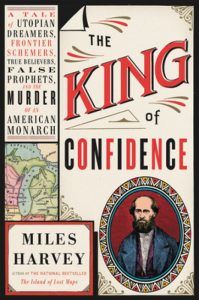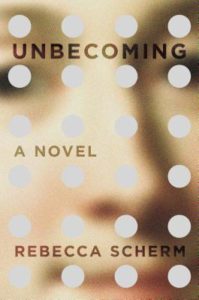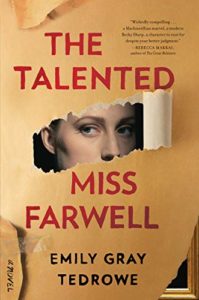Why are con artist stories so often stories about social class? Does the attraction stem from the excitement of reading about a perpetrator who aspires to the upper crust and makes it happen through deception? Or is the frequency of this trope driven by an uneasy awareness of our own class-based notions, a problematic agreement that some crimes can be socially sanctioned?
In The Confidence Game journalist and psychologist Maria Konnikova points out that “many con artists aren’t even after money.” In truth, there are probably as many motivations as there are cons: domination, psychosis, thrill, you name it. When I came to write my own novel about a con artist, one of the central questions guiding me was whether I could induce readers to sympathize with my protagonist if she committed her crimes in the name of art. Specifically, paintings and sculpture, works of art that she is obsessed with and must own at almost any cost. One quote that lingered in my mind while writing was Faulkner’s: “If a writer has to rob his mother, he will not hesitate; the ‘Ode on a Grecian Urn’ is worth any number of old ladies.” Though Faulkner was referring to the amorality of writers, I wonder if the proliferation of social mobility stories in the books about con artists comes from a similar place. Are we more likely to excuse fraud—or enjoy depictions of it—committed in the name of “the finer things in life”? What about duplicity and theft as means to accessing career connections, coveted invitations, an Ivy League education?
Here are five books in which con artists extraordinaire grapple with social class as a tool, an obstacle, and a reward.
Ripley’s Game, Patricia Highsmith
No surprise to see Ripley first on this list. Fans of Highsmith’s exquisitely tense series well know the basis of Tom Ripley’s origin story and how he leveraged his move from Boston-born boarding-house denizen to Italian palazzo dweller through insinuation into the life and affections of poor dull Dickie Greenleaf. But that was in the first novel. In Ripley’s Game, third in the series, Tom is comfortably ensconced in his French villa Belle Ombre with his wealthy wife Heloise and housekeeper Mme. Annette. In between various murders and cover-ups he indulges a passion for extensive gardening and landscaping, presides over the daily menu, visits museums, and is constantly offering guests—or the local gendarme—a coffee or aperitif. “Sounds a pleasant life,” an accomplice mutters sourly. Shortly after learning a partner in crime has had his flat fire-bombed, Tom decides to acquire a harpsichord for he and Heloise to take lessons on. That “might cost a goodly sum… but a harpsichord certainly came in the category of cultural acquisitions, so Tom did not reproach himself for the desire.” But surely the most hilarious posh detail comes as Tom and a fellow criminal are hunkered down in Belle Ombre, expecting a vicious home invasion at any moment. Always the proper host, Tom worries that Jonathan, huddled outside in the bushes with a bludgeon, might be getting a tad peckish. So he tiptoes into his darkened kitchen, and makes some caviar canapés—and conveniently “the caviar was left over from last night, in its jar in the fridge, so the job was quick.” Lucky visiting hit man!
Blood Will Out, Walter Kirn
The title of this memoir hints at the strong undercurrent of class anxiety driving novelist and journalist Kirn’s story of befriending (and ultimately being duped by) an impostor who called himself Clark Rockefeller, among several other alibis. “I wasn’t a victim; I was a collaborator,” writes Kirn, both of his willingness to believe a person whose lies grew more and more outrageous and of the way he found himself accepting Clark based on class signifiers such as Ivy League connections, Lotos Club membership, and a New England proximity to J.D. Salinger. Kirn deftly interrogates not only the sordid (and indeed murderous) actions of his former acquaintance but also his own credulousness, partially stemming from insecurity and past history. One of the standout features of this book is the author’s ability to interweave personal experience and reportage (he attends “Rockefeller”’s trial), so that a reader comes away with a satisfyingly uneasy sense of how a con plays on assumptions and expectations that many of us might share.
The King of Confidence, Miles Harvey
In the mid-19th century, a rural New York lawyer named James Strang came to the Midwest, converted to the new Mormonism, and then moved with a following to Michigan’s Beaver Island where he declared himself a divine king and ruled until he was assassinated. No, not historical fiction—this is fact, beautifully researched and written by DePaul English professor Miles Harvey, whose book’s subtitle is “A Tale of Utopian Dreamers, Frontier Schemers, True Believers, False Prophets, and the Murder of an American Monarch.” As Harvey points out, one of the key factors for Strang’s epic con was his ability to play on the fears racking countless Americans who suddenly found themselves “losers in mid-nineteenth-century America’s economic, demographic, and social convulsions.” By convincing regular folks that they could be close to an actual king, who would rule the world, Strang dangled courtier dreams to delude his followers.
Unbecoming, Rebecca Scherm
This compelling 2015 novel depicts a young American woman named Julie, AKA Grace, in her new job as a jewelry mender on the outskirts of Paris. Back in Tennessee, however, two men are paroled for a crime that Grace knows too much about. In France, as her past begins to catch up with her, the motif of jewelry—made, unmade, fake and real—stands in for how a person might give herself a glow-up to disguise a background made of too-young parents who met at a Van Halen concert, college dropouts and Nissan plant shift work. Unbecoming is a heist novel that is also about the intersection of class and gender: how women are conditioned to use manners and appearance in performing social status. As one character bitterly tells Grace, “You’d nice up so fast and so bright that you’d bleach out every shadow, every detail. You’d have everyone in the room staring at you and they couldn’t see a goddamn thing.”
My Friend Anna: The True Story of a Fake Heiress, Rachel DeLoache Williams
Notorious grifter Anna Delvey (real name Anna Sorokin) was all over the media in after she was arrested in 2017, with New York buzzing about the various ways she had insinuated herself into bold-name parties, restaurants, and clubs without managing to pay for any of it. My Friend Anna is a memoir that tells a deeper, more personal (and more painful) story, about a young woman from Tennessee who lands a dream job as a photo editor at Vanity Fair and is ultimately betrayed by a person she considered a true friend. In this case, social status is conferred (and created) by that most slippery of venues, social media. Williams has written that Anna’s 40K Instagram followers was the convincing touch in Delvey’s story of being a German heiress who—oops!—merely forgot to bring her credit cards on several different occasions, including a luxury vacation in Marrakech that stuck Williams with the entire bill. In this case, class status signifiers (such as fashion shows, concierge service, private personal trainers) were the means of exchange between two young women in Manhattan: one who had little knowledge about what she imagined to be the jetsetting trust fund world, and one who was all too willing to take advantage of that.
***























